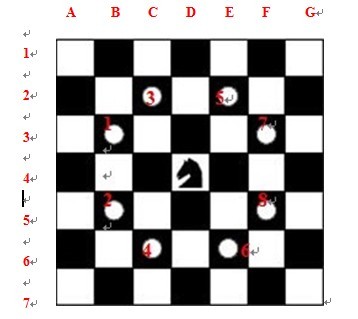Background
The knight is getting bored of seeing the same black and white squares again and again and has decided to make a journey
around the world. Whenever a knight moves, it is two squares in one direction and one square perpendicular to this. The world of a knight is the chessboard he is living on. Our knight lives on a chessboard that has a smaller area than a regular 8 * 8 board, but it is still rectangular. Can you help this adventurous knight to make travel plans?
Problem
Find a path such that the knight visits every square once. The knight can start and end on any square of the board.
Input
The input begins with a positive integer n in the first line. The following lines contain n test cases. Each test case consists of a single line with two positive integers p and q, such that 1 <= p * q <= 26. This represents a p * q chessboard, where p describes how many different square numbers 1, . . . , p exist, q describes how many different square letters exist. These are the first q letters of the Latin alphabet: A, . . .
Output
The output for every scenario begins with a line containing "Scenario #i:", where i is the number of the scenario starting at 1. Then print a single line containing the lexicographically first path that visits all squares of the chessboard with knight moves followed by an empty line. The path should be given on a single line by concatenating the names of the visited squares. Each square name consists of a capital letter followed by a number.
If no such path exist, you should output impossible on a single line.
Sample Input
3 1 1 2 3 4 3
Sample Output
Scenario #1: A1 Scenario #2: impossible Scenario #3: A1B3C1A2B4C2A3B1C3A4B2C4

///给出一个p行q列的国际棋盘,马可以从任意一个格子开始走,问马能否不重复的走完所有的棋盘。
///如果可以,输出按字典序排列最小的路径。
///打印路径时,列用大写字母表示(A表示第一列),行用阿拉伯数字表示(从1开始),先输出列,再输出行。
///要求字典序最小,则可从A1开始进行遍历(dfs),且骑士每次走都要按照字典序最小优先行动(如图顺序)
#include<cstdio>
#include<cstring>
#include<algorithm>
using namespace std;
const int M=100;
int path[M][2], vis[M][M], p, q, cnt;///vis数组用于表示某点是否已被达到,path数组记录路径信息
bool flag;///判断是否可实现遍历
int dx[8] = {-1, 1, -2, 2, -2, 2, -1, 1};///操作单位化
int dy[8] = {-2, -2, -1, -1, 1, 1, 2, 2};
bool judge(int x, int y)
{
if(x>=1&&x<=p&&y>=1&&y<=q&&!vis[x][y]&&!flag)
return true;
return false;
}
void dfs(int r, int c, int step)
{
path[step][0] = r;
path[step][1] = c;
if(step == p * q)
{
flag = true;
return ;
}
for(int i = 0; i < 8; i++)
{
int nx = r + dx[i];///行
int ny = c + dy[i];///列
if(judge(nx,ny))
{
vis[nx][ny] = 1;
dfs(nx,ny,step+1);
vis[nx][ny] = 0;
}
}
}
int main()
{
int i, j, n, cas = 0;
scanf("%d",&n);
while(n--)
{
flag = 0;
scanf("%d%d",&p,&q);
memset(vis,0,sizeof(vis));
vis[1][1] = 1;
dfs(1,1,1);
printf("Scenario #%d:\n",++cas);
if(flag)
{
for(i = 1; i <= p * q; i++)
printf("%c%d",path[i][1] - 1 + 'A',path[i][0]);
}
else
printf("impossible");
printf("\n");
if(n != 0)
printf("\n");
}
return 0;
}
反思:棋子遍历问题是很经典的dfs,通常可以剪枝和控制搜索深度来优化(虽然这题没优化就跑出来了)。基本的思想就是dfs,这个对每次搜索的方式有要求(这个题是字典序,通过起点最小化和每一步的操作特定的先后顺序来实现)。常见的套路要熟练(dfs(),dx/dy,path[],vis[],回溯复原,judge()等等)。这算是个很裸的题了,刚开始学,参考了题解写的,需要常练习。





















 308
308











 被折叠的 条评论
为什么被折叠?
被折叠的 条评论
为什么被折叠?








